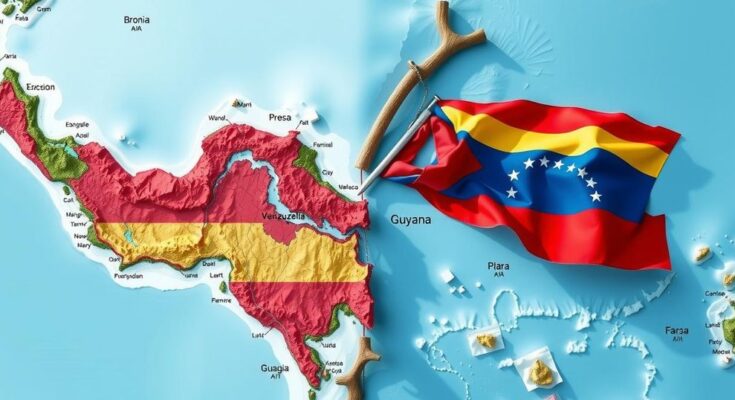Guyana intends to approach the United Nations’ top court to challenge Venezuela’s plans to elect a governor for the disputed Essequibo region. Citing violations of a December 2022 agreement, Guyana’s foreign ministry insists that Venezuelan actions threaten both the judicial process and international law. The conflict remains inflamed, particularly following oil discoveries in the region and recent territorial tensions.
Guyana has announced its intention to appeal to the United Nations’ highest court in response to Venezuela’s proposal to elect a governor for the Essequibo region, a resource-rich area claimed by Venezuela. The Government of Guyana contends that this plan breaches a December 2022 agreement aimed at preventing escalation over the territorial dispute. The foreign ministry asserted, “The people of Guyana’s Essequibo region are Guyanese nationals who live in Guyana’s sovereign territory,” describing any Venezuelan election in the area as a violation of international law.
In light of Venezuela’s intentions, Guyana plans to request provisional measures from the International Court of Justice in The Netherlands to halt related activities in Essequibo. The ministry emphasized that Venezuela’s actions would undermine both the ongoing judicial process and the authority of the court as the pinnacle judicial body of the United Nations. Historically, Venezuela has asserted its claim over Essequibo based on colonial maps from the Spanish period, rejecting the definitive borders established in 1899.
This territorial conflict intensified following significant oil and gas discoveries off the coast of Guyana since 2015, which raised Venezuela’s interest in the region. The dispute has also been marked by recent events, such as Guyana’s objections to a bridge constructed by Venezuela’s military on the disputed Ankoko Island, which Guyana views as a violation of its sovereignty. Although tensions had subsided in the previous year, particularly after U.S. military support was shown to Guyana, the situation remains volatile as both nations navigate the implications of the ongoing dispute over Essequibo.
The territorial dispute over the Essequibo region has its roots in colonial history, particularly during the Spanish colonial period, which has led to competing claims between Venezuela and Guyana. The area in question, which constitutes two-thirds of Guyana’s landmass, has witnessed heightened interest from Venezuela due to its resource wealth, especially after significant oil discoveries in 2015. Despite a ruling by international arbitrators in 1899 that delineated Guyana’s borders, Venezuela continues to contest this designation, invoking a 1966 agreement as grounds for its claims. The situation is complicated further by diplomatic negotiations and the involvement of international judicial entities, reflecting ongoing tensions between the nations.
In conclusion, Guyana is actively seeking judicial intervention from the International Court of Justice to counter Venezuela’s plans concerning the Essequibo region, an area marked by vast resources and contested sovereignty. The actions by Venezuela are viewed as a significant infringement of international law, prompting Guyana to take a stand to protect its territorial integrity. This dispute is not merely a matter of land ownership; it encapsulates the broader geopolitical dynamics at play in Latin America, particularly in regions endowed with natural resources.
Original Source: apnews.com




